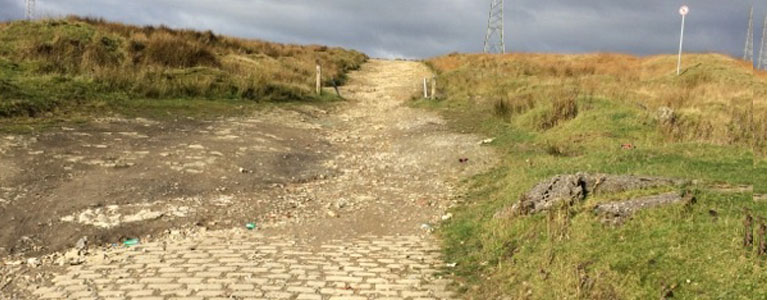Rochdale has a proud and rich industrial past most famously as the place where the pioneering Co-operative movement was born.
Yet nestled away on Rooley Moor, with spectacular views across the south Pennine hills, stands a famous landmark to a lesser-known local struggle for social progression, which is set to feature in a new BBC 2 series ‘Black and British: A Forgotten History’.
An historic Victorian stone road, widely known as the ‘Cotton Famine Road’, is a monument to the fascinating story of Rochdale cotton workers siding with the Union cause during the American Civil War.
Lancashire workers sided with the African slaves who picked cotton in the US to support President Abraham Lincoln’s pledge to abolish slavery. This was despite a Union blockade of Confederate ports causing a shortage of cotton supplies coming to Rochdale that caused the ‘cotton famine’ which starved thousands of men and women of their livelihoods.
The workers’ campaign also received the backing of famous Rochdale statesman and radical John Bright, a lifelong opponent of slavery, who had a profound influence on President Lincoln.
At the time of the ‘famine’ Lancashire was the leading producer of finished cotton goods in the world, with Rochdale itself having numerous cotton factories providing the beating heart of a thriving local economy.
Local campaigners didn’t complain, they organised, successful lobbying for the 1863 Public Works Act, allowing Rochdale’s civic leaders to borrow money at a low interest rate. This funded vital civic improvements, including to Catley Lane, which the important Pennine route for transporting goods was then called.
A Timeless local landmark
Today the road’s official name is Rooley Moor Road, part of a popular walking route to Bacup. For many it will always be the ‘Cotton Famine Road’; a timeless local landmark to the international struggle to abolish the Atlantic slave trade.
The four-part television series will explore historic social links between the UK and the people of Africa. The series will show specially designed plaques being unveiled at locations across the UK, former colonies and the Commonwealth.
The BBC-funded plaque on Cotton Famine Road simply reads ‘In memory of the Rochdale millworkers who supported the struggle against slavery during the American Civil War 1861-1865.
Councillor Janet Emsley, Rochdale Borough Council cabinet member with responsibility for culture, said: “This is a powerful story, vividly capturing the devastating impact the cotton famine had on the local economy with job losses, mill closures and social upheaval. It underlines how the Rochdale trade union movement proudly stood up for equality, freedom and social progression, not just locally but across the globe.
“The decision by local cotton workers to support the union cause was brave, but also very principled. It’s wonderful that such a famous Rochdale landmark has a plaque, ensuring this fascinating story will live on for generations to come. I am proud of the role our town played both in pioneering cooperation and playing a significant role in the abolition of the awful and barbaric slave trade.”
Spotland and Falinge Councillor Cecile Biant was also actively involved in the project, as a member of the Rooley Moor Neighbourhood Forum.
The 1st episode of Black and British: A Forgotten History is on BBC 2, Wednesday, 9 November 2016 at 9pm. Rochdale is set to feature in the 3rd episode on Wednesday, 23 November 2016.
Original article here:

